Medication Adherence Calculator
How Well Are You Adhering?
Estimate your actual adherence rate based on real-world factors
Your Estimated Adherence Rate
Based on your inputs:
What does this mean? 80% adherence is considered good for most chronic conditions (per WHO guidelines). This means you get most of the benefit without burnout.
Remember: Your treatment shouldn't cost you your quality of life. If side effects or complexity are causing you to skip doses, talk to your doctor about alternatives.
Why Taking Your Pills Isn’t as Simple as It Sounds
You’ve been told to take your blood pressure pill every morning. Your diabetes meds at lunch. Your painkiller at night. Easy, right? Except it’s not. For nearly half of all people managing chronic conditions, sticking to a medication schedule feels less like health care and more like a constant tug-of-war between staying alive and living well.
The World Health Organization calls it medication adherence-not compliance. That’s important. Compliance sounds like obedience. Adherence means you’re part of the decision. And when your meds make you too tired to play with your kids, cause stomach cramps during work meetings, or kill your sex drive, you start asking: Is this worth it?
Here’s the hard truth: drugs don’t work if you don’t take them. But they also don’t work if you hate taking them.
What Adherence Really Means (And Why 80% Is the New Perfect)
Doctors often talk about perfect adherence-taking every single pill, every single time. But in real life, that’s rare. And honestly, it’s not always the goal.
Health experts now use an 80% threshold to define adherence. That means if you take your meds 80% of the time over a month, you’re doing well. Not perfect. But good enough to get the benefits without burning out.
Why 80%? Because studies show that going beyond that doesn’t add much more protection-especially when you’re sacrificing sleep, energy, or mental peace to hit 100%. A person who takes their heart medication 85% of the time and feels like themselves? They’re more likely to stick with it for years than someone who’s exhausted from a 12-pill-a-day routine.
Measuring adherence isn’t about counting pills. It’s about how many days you actually had the medicine available. That’s called PDC-Proportion of Days Covered. It’s more accurate than just checking how many bottles you’ve refilled. But even that doesn’t tell the full story. You could have the pills, but still skip them because the side effects are too much.
The Hidden Cost of Side Effects
Side effects aren’t just annoying. They’re deal-breakers.
One in five people who stop taking their meds do so because of how the drugs make them feel. Drowsiness. Dry mouth. Nausea. Weight gain. Sexual dysfunction. These aren’t rare side effects-they’re common. And they hit harder when you’re trying to work, care for kids, or keep up with friends.
On Reddit, people in chronic pain communities say they intentionally cut their opioid doses before family gatherings. Not because they don’t care about their health-but because they want to be present. Not sedated. Not spaced out. Just… there.
Same with diuretics for heart failure. People skip their evening dose before going out to dinner because they don’t want to be glued to the bathroom. Or someone on antidepressants stops taking them for a weekend because the emotional numbness makes holidays feel hollow.
These aren’t acts of rebellion. They’re survival tactics. And too often, doctors hear it as non-compliance-not a patient trying to live.
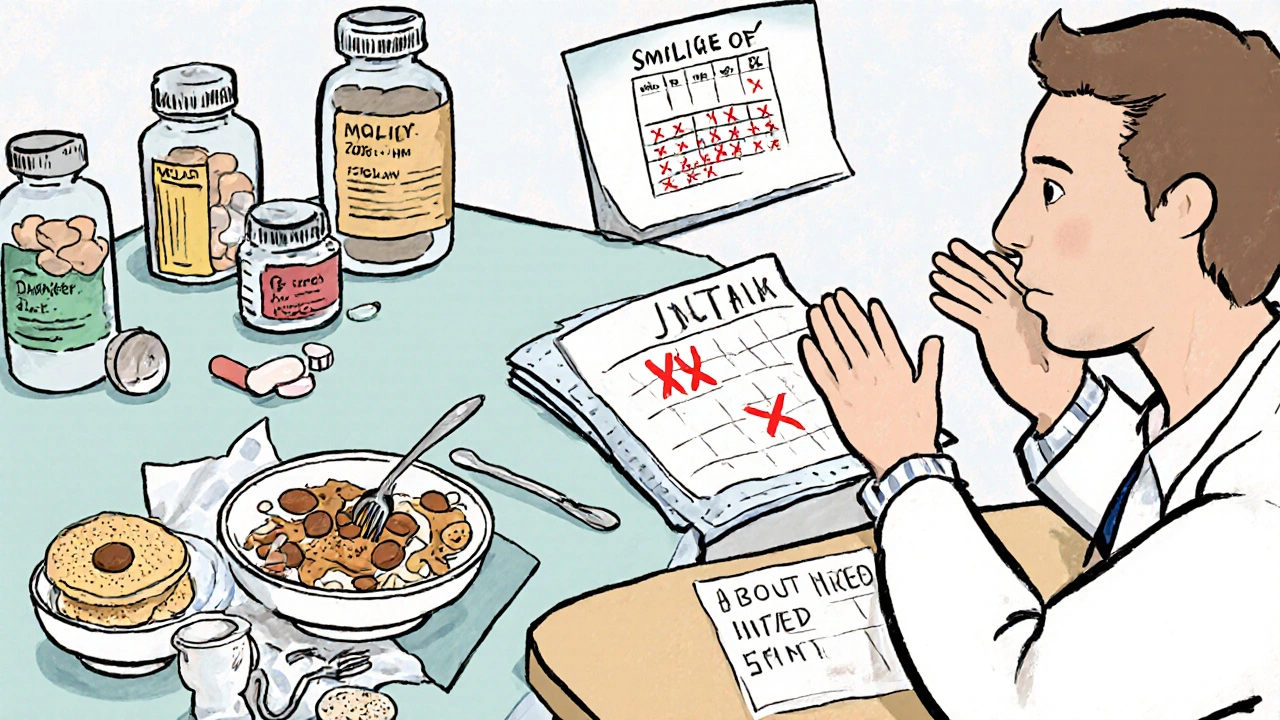
When the Regimen Is Too Much
Every extra pill you have to take each day cuts adherence by about 26%.
Imagine this: You’re on five different medications. Three times a day. That’s 15 pills. Plus vitamins. Plus supplements. Now add timing: some need to be taken on an empty stomach. Others with food. One has to be taken at 7 a.m. sharp. Another can’t be taken after 6 p.m.
That’s not a treatment plan. That’s a full-time job.
Studies show that simplifying the schedule-switching from three times daily to once daily-boosts adherence by nearly a third. That’s why once-daily pills are now the gold standard. Why some patients switch from daily pills to weekly injections. Why a rheumatoid arthritis patient saw their adherence jump from 55% to 92% after switching from daily methotrexate pills to a weekly auto-injector.
It’s not about being lazy. It’s about designing a system that fits into your life-not the other way around.
Money Matters More Than You Think
One in four Americans skips doses because they can’t afford their meds.
That’s not a statistic. That’s your neighbor. Your coworker. Maybe you. A $500 insulin co-pay? A $1,200 monthly blood thinner? People cut pills in half. Stretch refills. Skip days. And then end up in the ER because their condition spiraled.
It’s not just about the price tag. It’s about the choice: Do I pay for my meds or my rent? My groceries or my blood pressure pills?
Health systems are starting to notice. Some pharmacies now offer $4 generic lists. Some insurers cover free delivery. Some clinics have on-site pharmacists who help you find patient assistance programs. But these aren’t universal. And if you’re in a rural area or on a tight budget, you’re still left figuring it out alone.
What Works: Real Strategies That Actually Help
There’s no magic fix. But some things consistently move the needle.
- One pill, once a day: If your doctor prescribes multiple doses, ask if there’s a combo pill or once-daily version. It’s often available.
- Use a pill organizer: A simple weekly box can cut missed doses by 22%. But only if you’re willing to fill it. For some, that’s a daily chore. For others, it’s a lifeline.
- Ask for a brown bag review: Bring all your meds-prescription, over-the-counter, supplements-to your next appointment. Pharmacists catch interactions, duplications, and unused pills in minutes. Sixty-three percent of patients have something wrong with their regimen when they do this.
- Try apps like Medisafe: They send reminders and track doses. But only 28% of people over 65 keep using them past three months. Tech helps-but only if it’s simple.
- Use motivational interviewing: This isn’t a lecture. It’s a conversation. Your provider asks: “What’s hardest about taking your meds?” Then listens. Then helps you problem-solve. It’s not about guilt. It’s about partnership.
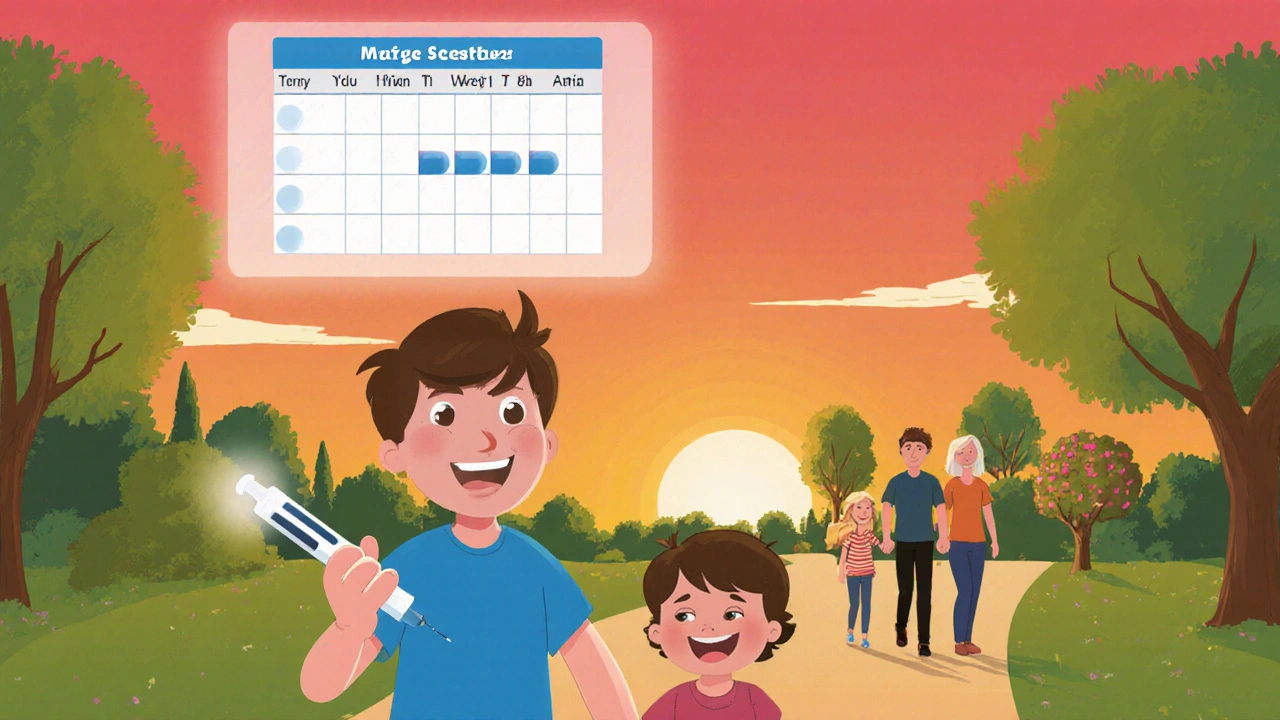
The New Way Forward: Tailoring, Not Just Telling
The most promising shift in medicine right now? Adherence tailoring.
Instead of saying, “Take this every day,” providers are starting to say: “Which part of your routine can you stick to? What are you willing to compromise on?”
One patient says: “I’ll take my morning pill no matter what. But I need to skip the night one if I’m going out.” That’s not a problem. That’s a plan.
Another says: “I can’t handle the dizziness from my blood pressure med. Can we try a different one?” And the doctor says yes.
These aren’t exceptions. They’re the future. The FDA now requires drug makers to study how side effects impact daily life before approving new meds. Health systems are training doctors to have these conversations. And patients? They’re speaking up more.
Adherence isn’t about obedience. It’s about sustainability. It’s about making sure your treatment doesn’t cost you your life-your real, messy, beautiful, everyday life.
What to Ask Your Doctor
If you’re struggling, here’s what to say next time you see your provider:
- “I’m having trouble with the side effects. Can we talk about alternatives?”
- “Is there a simpler way to take this? Maybe a once-daily version?”
- “I’m worried about the cost. Are there cheaper options or programs that help?”
- “What’s the minimum I need to take to stay safe? Can we adjust based on my life?”
- “Can we set a goal that works for me-not just what’s on the chart?”
Good doctors don’t judge. They adapt. And if they don’t? It’s time to find one who will.
What if I skip a dose on purpose-is that dangerous?
It depends. Skipping a dose occasionally because of side effects or life events is common-and not always harmful. But doing it regularly can reduce treatment effectiveness, especially for conditions like high blood pressure, diabetes, or epilepsy. The key is communication. Tell your doctor why you’re skipping. They can help you adjust the plan instead of just punishing you for it.
Is it okay to stop taking meds if I feel fine?
No-not without talking to your doctor. Many chronic conditions, like high cholesterol or hypertension, don’t cause symptoms until damage is done. Feeling fine doesn’t mean the disease is gone. Stopping meds can lead to sudden, serious complications like heart attack or stroke. Always check with your provider before making changes.
How do I know if my meds are causing my side effects?
Track your symptoms. Write down when you take your meds and when you feel off. Did the fatigue start after you began the new pill? Did the nausea begin after you increased the dose? Bring this log to your doctor. Sometimes it’s not the drug-it’s a mix, or an interaction. But you can’t know unless you track it.
Can I switch to natural remedies instead?
Some supplements can help-like omega-3s for triglycerides or magnesium for blood pressure-but they’re not replacements for proven medications. Natural doesn’t mean safe or effective. And mixing supplements with prescriptions can be dangerous. Always talk to your doctor before switching or adding anything.
Why don’t doctors talk more about quality of life?
Many don’t know how to. Medical training focuses on disease control, not daily living. But that’s changing. More doctors are learning shared decision-making. If your provider doesn’t ask about your life outside the clinic, it’s okay to ask them to. You’re not being difficult-you’re being honest. And that’s the first step to better care.
Final Thought: Your Life Matters More Than Your Pill Count
Medication adherence isn’t about perfection. It’s about partnership. It’s about finding a balance where your treatment supports your life-not the other way around.
There’s no shame in needing flexibility. No weakness in asking for help. The goal isn’t to take every pill. The goal is to live well, for as long as possible. And sometimes, that means taking less-but taking it smarter.

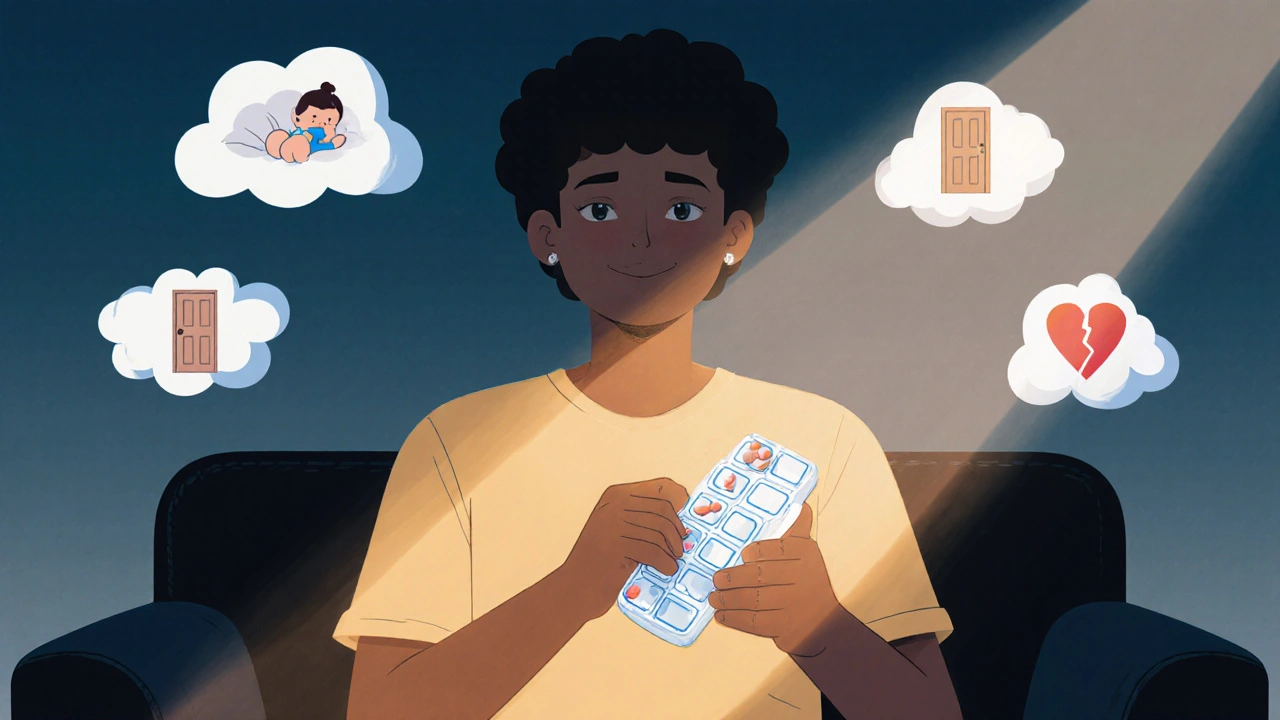
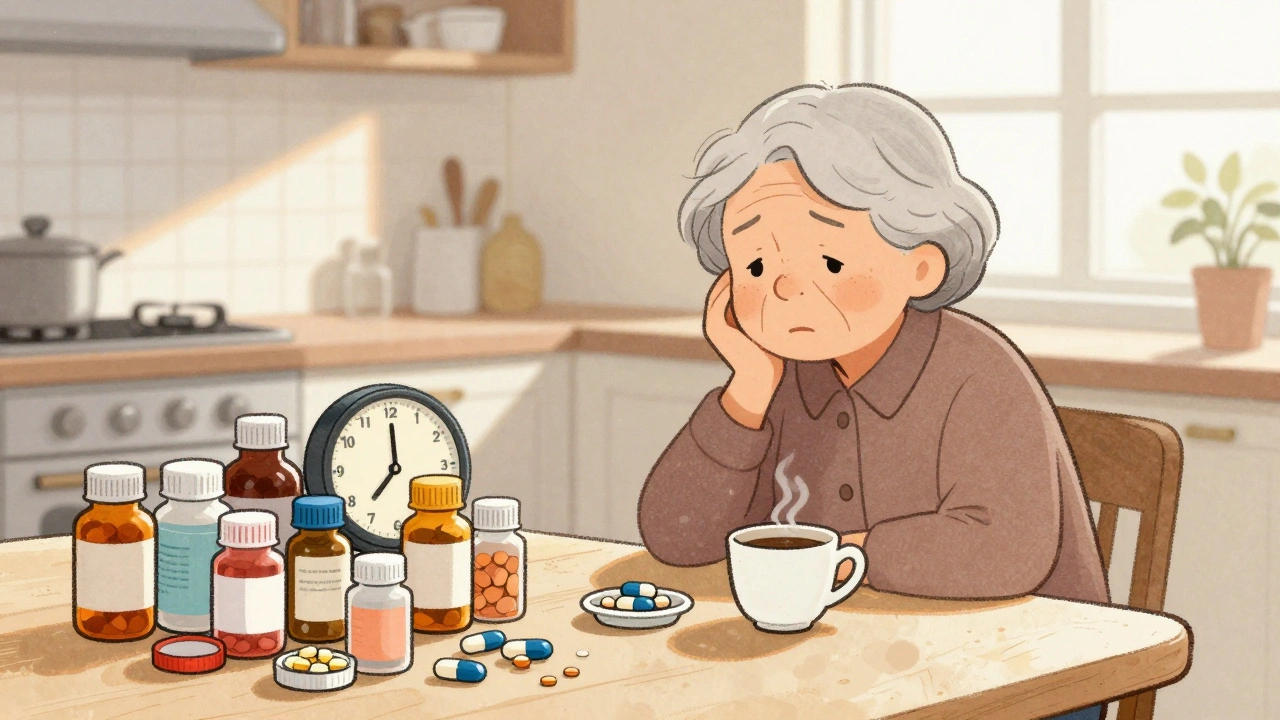
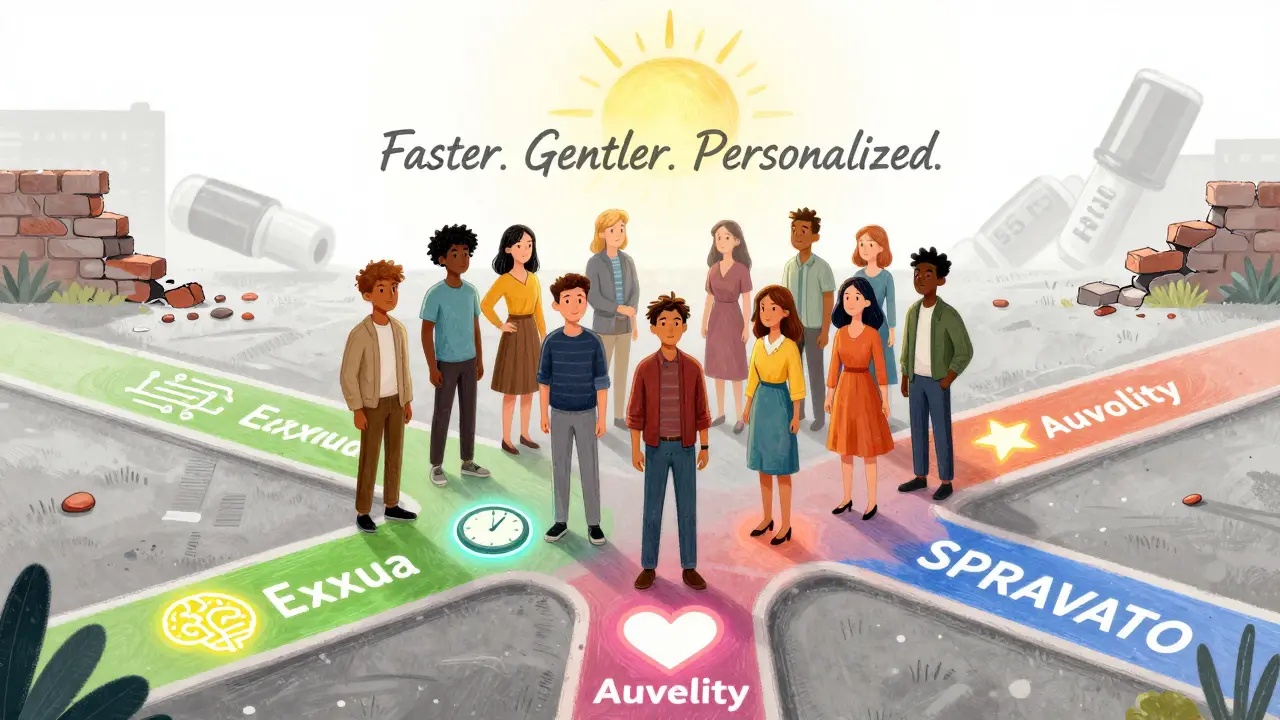





Neoma Geoghegan
November 25, 2025 AT 08:36Bartholemy Tuite
November 25, 2025 AT 12:05Sam Jepsen
November 26, 2025 AT 20:43Yvonne Franklin
November 28, 2025 AT 15:49David Cunningham
November 29, 2025 AT 23:33luke young
November 30, 2025 AT 17:18james lucas
December 1, 2025 AT 08:57Jessica Correa
December 2, 2025 AT 19:54manish chaturvedi
December 4, 2025 AT 04:37Nikhil Chaurasia
December 5, 2025 AT 11:35Holly Schumacher
December 5, 2025 AT 22:16Michael Fitzpatrick
December 7, 2025 AT 14:46Shawn Daughhetee
December 8, 2025 AT 14:35Miruna Alexandru
December 10, 2025 AT 07:31Justin Daniel
December 10, 2025 AT 09:22